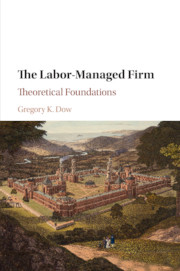Book contents
- The Labor-Managed Firm
- The Labor-Managed Firm
- Copyright page
- Dedication
- Epigraph
- Contents
- Figures
- Preface
- Part I Setting the Stage
- Part II Perfection and Symmetry
- Part III Imperfection and Asymmetry
- Part IV Appropriation Problems
- Part V Public Good Problems
- 12 Collective Choice and Investor Takeovers*
- 13 Free Riding and Employee Buyouts
- Part VI Opportunism Problems I
- Part VII Opportunism Problems II
- Part VIII Synthesis and Agenda
- References
- Index
12 - Collective Choice and Investor Takeovers*
from Part V - Public Good Problems
Published online by Cambridge University Press: 20 April 2018
- The Labor-Managed Firm
- The Labor-Managed Firm
- Copyright page
- Dedication
- Epigraph
- Contents
- Figures
- Preface
- Part I Setting the Stage
- Part II Perfection and Symmetry
- Part III Imperfection and Asymmetry
- Part IV Appropriation Problems
- Part V Public Good Problems
- 12 Collective Choice and Investor Takeovers*
- 13 Free Riding and Employee Buyouts
- Part VI Opportunism Problems I
- Part VII Opportunism Problems II
- Part VIII Synthesis and Agenda
- References
- Index
Summary
- Type
- Chapter
- Information
- The Labor-Managed FirmTheoretical Foundations, pp. 193 - 211Publisher: Cambridge University PressPrint publication year: 2018



